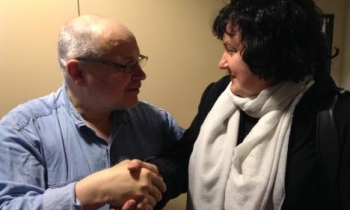There is, writes Virginia Postrel in her column on Forbes.com, 'something about blogs [that] makes a lot of respectable journalists hyperventilate. News pros seem terribly threatened by online amateurs.' As an illustration she quotes a Los Angeles Times columnist, David Shaw, an über-hack who won a Pulitzer Prize in 1991 for his media criticism. Blogging, Shaw writes, is a 'solipsistic, self-aggrandising, journalist-wannabe genre'. Bloggers are 'practitioners of what is at best pseudo-journalism' and 'many bloggers ... don't seem to worry much about being accurate'.
Postrel goes on to point out that Shaw omits to provide any links to blogs which illustrate these dismissive claims - in itself an interesting lapse in journalistic standards. But that is par for this course.
And it isn't just professional hacks who editorialise like this. Non-journalists who are dismissive of blogs behave similarly - and in my experience those who are most critical have rarely actually seen any blogs, and certainly have not read any serious ones. But in truth the view that 'all blogs are x' (where x = 'self-indulgent', 'vanity publishing', 'solipsistic' or whatever other term of abuse comes to mind) is as absurd as the view that 'all books are x' or 'all newspapers are x'.
The 'blogosphere' is unimaginably diverse (there are more than 10 million of them out there) and blogs - like books and newspapers - come in every conceivable shape, type and quality. There are thoughtful blogs, silly blogs, truthful blogs, fanatical blogs, ideological blogs, biased blogs, knowledgeable blogs - just as there are thoughtful, silly, fanatical, ideological, biased and knowledgeable books. Not to mention newspapers and magazines: when was the last time you believed anything you read in the Sunday Sport ?
Just after reading the Postrel column, I chanced on the blog of Steven Johnson, a cultural critic who has written several perceptive books, one of which, Interface Culture , has deservedly become a classic. He was in London last week, promoting his latest book, Everything Bad is Good for You. This is a vigorous defence of contemporary culture which challenges the conventional wisdom that (American) popular culture is vile and debased, appeals to the lowest common denominator, is dominated by sensationalistic exploitation and dumbing down, etc.
This is a tough case to argue, and I haven't read the book yet, but Johnson is a fine writer and I'm looking forward to seeing how he attempts it. In the meantime, like any other hack, I've been reading the reviews. On his blog, Johnson discusses media responses to his book. He also provides links to com ments on it. One of these led me to a blog with the improbable title of 'The Pinocchio Theory'.
As I clicked on it, I had an image of the LA Times 's fastidious columnist wrinkling his elegant nose. The subtitle - a quote from Bootsy Collins saying 'If you fake the funk, your nose will grow' - would have brought Shaw out in a disdainful rash. But in fact the link was to a fine essay by Steven Shaviro which is as erudite and thoughtful as anything you'd find in the London Review of Books , its New York counterpart or any other reputable literary journal. And it appears on - wait for it - a blog.
Large swathes of the journalistic profession (though not, I am glad to say, either The Observer or the Guardian ) are still in denial about blogging. In that sense, they resemble music industry executives circa 1999, denying the significance of online file- sharing. But the claim that blogging is a threat to journalism - that inside every blogger is a 'journalist-wannabe' trying to escape - is just daft.
What's happening is a small but significant change in our media ecology. All journalists worth their salt have always known that out there are readers, listeners or viewers who know more about a story than they do. But until recently, there was no effective way for this erudition or scepticism to find public expression. Letters to the editor rarely attract public attention - or impinge on the consciousness of journalists.
Blogging changes all that. Ignorant, biased or lazy journalism is instantly exposed, dissected and flayed in a medium that has global reach. (If you doubt that, ask Dan Rather and CBS.)
Conversely, good reporting and intelligent commentary is passed from blog to blog and spreads like wildfire beyond the jurisdiction in which it was originally published. This can only be good for journalism in the long run, if only because, as my mother used to say, sunlight is the best disinfectant.
Blogging won't wipe out journalism, for the simple reason that journalism requires skills and resources that bloggers will never have. But it will improve the practice of our trade. I don't expect that Pulitzer-winning Dave will like this prospect much. But he'll just have to get used to it.









